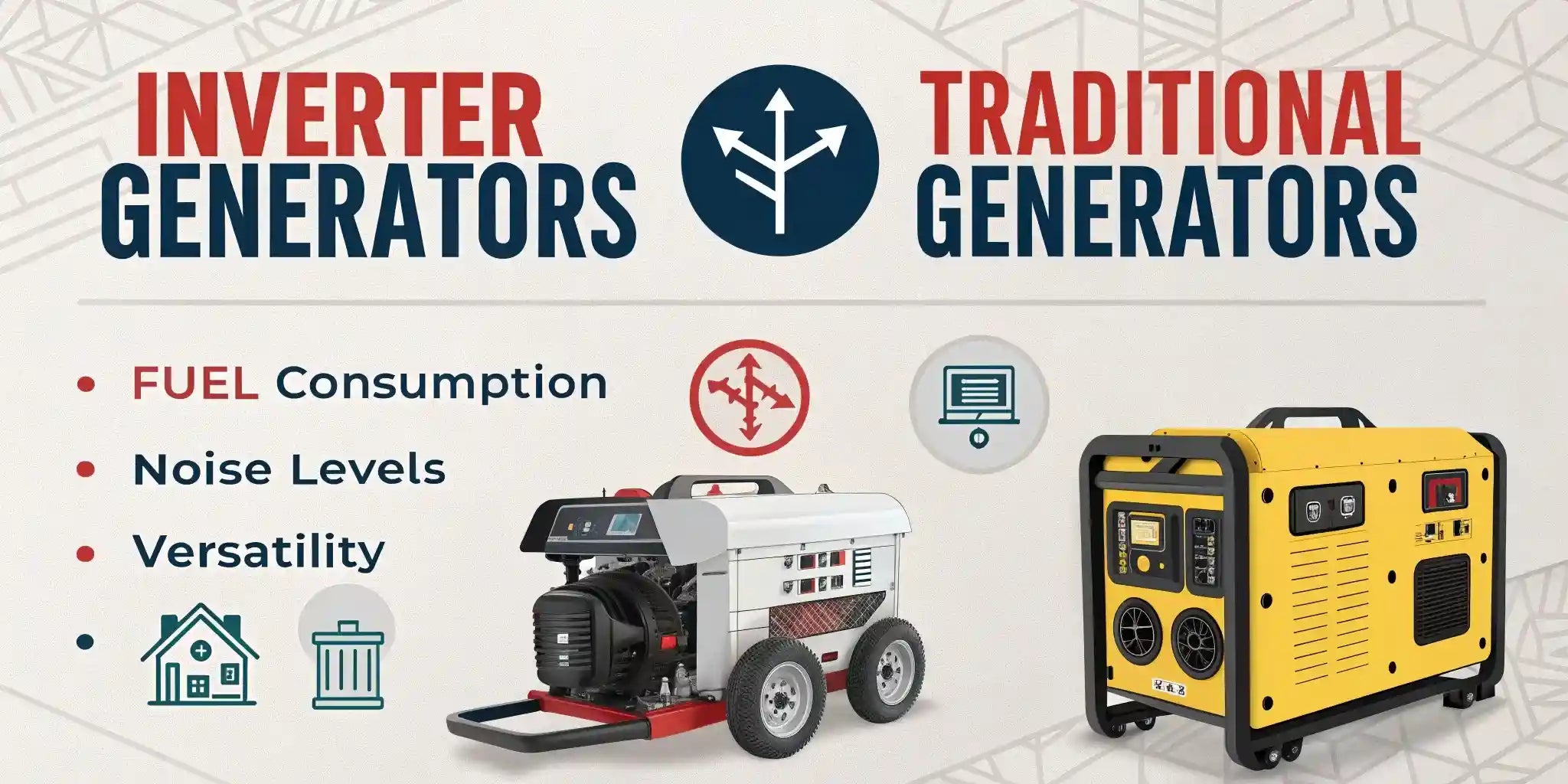Inverter Generators vs Traditional Generators Explained
When it comes to choosing a power solution for your home or business, understanding the differences between inverter generators and traditional generators is crucial. This guide will break down the technical jargon and help you decide which generator type best suits your needs. Whether you're a tech-savvy homeowner, an eco-conscious product developer, or a consumer electronics retailer, this article will provide you with valuable insights into the world of power generation.
Before diving into the differences between inverter and traditional generators, let's establish a basic understanding of what generators do.
A generator is a device that converts mechanical energy into electrical energy. This conversion allows you to power electrical devices when you don't have access to a standard power grid. Generators are commonly used during power outages, in remote areas, or for outdoor activities.

Traditional Generators
Traditional generators, also known as conventional generators, have been a staple in power generation for decades. They are well-known for their ability to produce substantial power output and are typically powered by gasoline or diesel engines.
How Traditional Generators Work
Traditional generators operate by maintaining a constant speed, usually around 3600 revolutions per minute (RPM), to produce a steady flow of electricity. This constant speed ensures that the generator produces a consistent frequency of power, typically 60 Hz in the United States.
Benefits of Traditional Generators
- High Power Output: Traditional generators can deliver significant power, making them suitable for large appliances and equipment.
- Durability: With fewer electronic components, traditional generators are often robust and can withstand harsh conditions.
- Affordability: Generally, they are more cost-effective upfront compared to inverter generators.
Drawbacks of Traditional Generators
- Noise Levels: These generators tend to be noisy, which can be disruptive in residential areas.
- Fuel Consumption: Traditional generators consume more fuel, leading to higher operational costs and increased emissions.
- Power Quality: They may produce less stable power, which can be harmful to sensitive electronics.
Inverter Generators
Inverter generators are a newer technology that has gained popularity due to their efficiency and versatility. They are designed to provide clean and stable power, making them ideal for modern electronics and appliances.

How Inverter Generators Work
Inverter generators produce AC (alternating current) power like traditional generators but convert it to DC (direct current) power and then invert it back to AC. This process ensures that the power output is consistent and stable, similar to the electricity supplied by your utility company.
Benefits of Inverter Generators
- Quiet Operation: Inverter generators operate more quietly, making them suitable for residential use and noise-sensitive environments.
- Fuel Efficiency: They adjust their engine speed based on the power demand, leading to reduced fuel consumption and lower emissions.
- Stable Power Output: The clean power produced is safe for delicate electronics, such as computers and smartphones.
- Portability: Typically lighter and more compact, inverter generators are easy to transport and store.
Drawbacks of Inverter Generators
- Higher Initial Cost: Inverter generators are generally more expensive upfront than traditional generators.
- Lower Power Output: They may not be suitable for powering large appliances or heavy machinery.
Key Differences Between Inverter and Traditional Generators
To help you make an informed decision, let's summarize the primary differences between inverter generators and traditional generators.
Power Output and Quality
- Traditional generators are better suited for high-power applications, while inverter generators excel in providing stable power for sensitive electronics.
Noise Levels
- Inverter generators are significantly quieter than traditional generators, making them ideal for residential use.
Fuel Efficiency
- Inverter generators offer better fuel efficiency due to their ability to adjust engine speed based on demand, reducing operational costs and emissions.
Portability
- Inverter generators are generally more compact and lightweight, making them easier to transport and store.
Cost
- Traditional generators are more affordable upfront, but inverter generators can save money over time through fuel efficiency and reduced maintenance costs.
Choosing the Right Generator for Your Needs
When deciding between an inverter generator and a traditional generator, consider the following factors:
Your Power Needs
- Evaluate the power requirements of the devices you plan to run. If you need to power large appliances or equipment, a traditional generator may be more suitable. For sensitive electronics, an inverter generator is the better choice.
Environmental Impact
- If reducing your carbon footprint is a priority, an inverter generator's fuel efficiency and lower emissions make it a more eco-friendly option.
Budget
- Consider your budget for both the initial purchase and ongoing operational costs. While inverter generators have a higher upfront cost, their efficiency can lead to long-term savings.
Usage Environment
- Think about where you will use the generator. If noise is a concern, an inverter generator is quieter and more suitable for residential areas.
Portability
- If you need a generator that is easy to transport and store, an inverter generator is the more convenient choice.
Conclusion
Inverter generators and traditional generators each have their unique advantages and drawbacks. By understanding the differences and considering your specific needs, you can choose the right generator to enhance your home's convenience and reliability while minimizing environmental impact. Whether you're powering a smart home, developing eco-friendly products, or selling electronics, this knowledge will help you make informed decisions and communicate effectively with your audience.
By integrating innovative power solutions, you can ensure that your power needs are met efficiently and sustainably, paving the way for a future of reliable and eco-conscious energy use.




